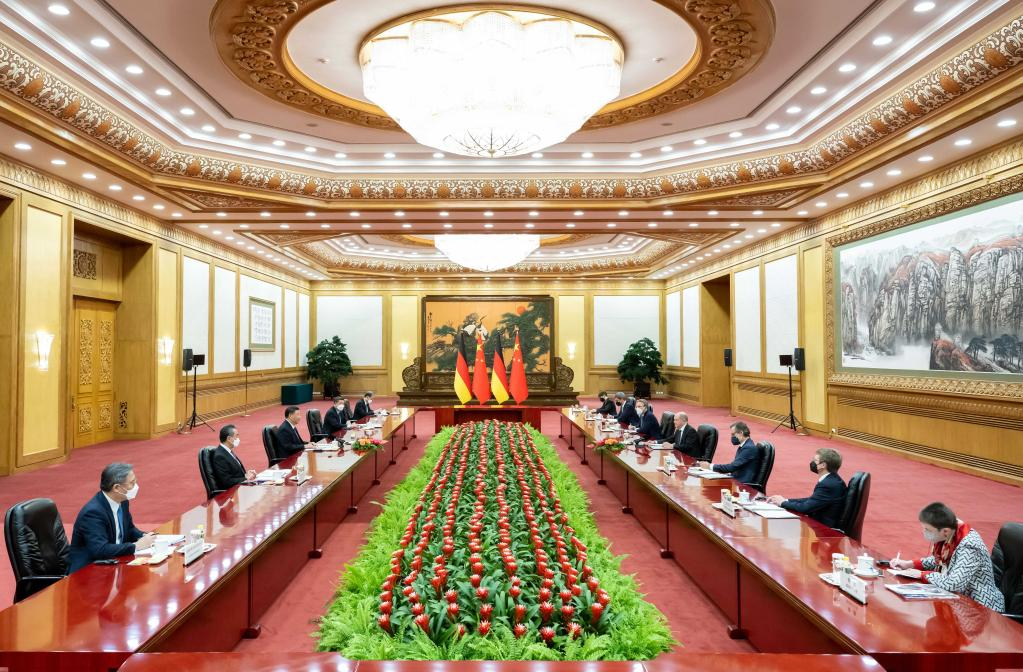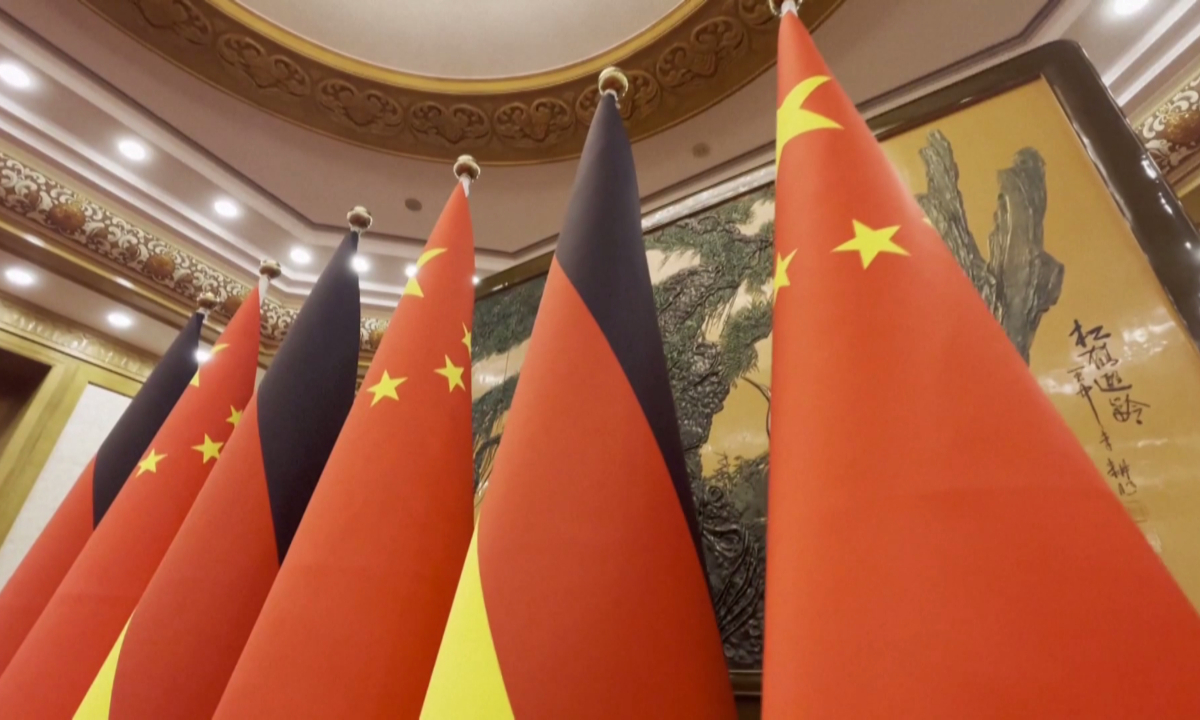
Chinese President Xi Jinping meets with German Chancellor Olaf Scholz on his official visit to China at the Great Hall of the People in Beijing, capital of China, Nov 4, 2022. Photo:Xinhua
Chinese and German leaders on Friday pledged to endorse economic globalization and forge closer partnerships in a wide range of areas, as German Chancellor Olaf Scholz's official visit to China came across as a pivotal confluence of the resurgence of pragmatism in Europe and the unfolding Chinese path to modernization.
Scholz's Friday visit, the first by a European leader following the 20th National Congress of the Communist Party of China (CPC), shone the spotlight on tangible business opportunities in new energy and digitalization, among other spheres, between the two major global powers.
Scholz's optimism-fueling visit demonstrates a massive vote of confidence among pragmatism-oriented European leaders and business executives who look to China for future growth, experts said, reckoning that more European leaders will follow Scholz's suit in fostering an expansion in trade with China rather than trumpeting decoupling with one of their most important trading partners.
On Friday morning, President Xi Jinping met with Scholz on his first visit to China as the Federal Chancellor. Xi briefed Scholz on the 20th CPC National Congress, with a particular focus on the essence of Chinese modernization.
China will stay committed to advancing high-standard opening-up, keep to the right direction in economic globalization, promote an open world economy, and expand converging interests with other countries, Xi said.
While exploring more cooperation potential in traditional areas, efforts should be made to energize cooperation in emerging fields such as new energy, artificial intelligence (AI) and digitalization, he continued.
In Scholz's words, Germany firmly supports trade liberalization and economic globalization, and opposes decoupling. Germany stands ready for closer trade and economic cooperation with China, and supports more mutual investment between Chinese and German businesses, he stated.
Later on Friday, Premier Li Keqiang met with Scholz and described economic and trade cooperation as a ballast for the development of bilateral relations.
China is willing to strengthen cooperation with Germany in trade and investment, manufacturing, vaccines and other major fields, push for the creation of a collaborative mechanism for handling climate change and increase direct flights between the two countries to facilitate people-to-people exchanges, Li said, according to Chinese state broadcaster CCTV.

The national flags of China and Germany in the Great Hall of the People in Beijing on November 4, 2022 Photo: VCG
The eagerly observed visit offers clues to what could be a turning point in economic globalization as Germany, a longtime leader in manufacturing, and China, a major manufacturing powerhouse in output terms, join hands to anchor one of the most consequential economic and trade relationships globally toward more pragmatic partnerships, observers said.
Germany is known for spearheading the fourth industrial revolution that envisions integrating emerging technologies into industrial production and operations. Its prowess dovetails with China's vision of building itself into a manufacturing power in sophistication terms, and therefore the two countries have a lot in common when it comes to deepening bilateral economic ties, Bai Ming, deputy director of the international market research institute at the Chinese Academy of International Trade and Economic Cooperation, told the Global Times on Friday.
China's road map toward modernization with a focus on fostering the real economy is seen as shedding a light on the tremendous opportunities out there in the manufacturing sector, notably remodeling traditional manufacturing with emerging technologies such as the internet of things, AI and big data. This suggests a multitude of opportunities for German businesses, Bai said.
Germany's eagerness to capitalize on China's promising market was typified by a delegation of industrial and commercial business leaders who also visited China.
Christian Sewing, CEO of Deutsche Bank, was among the delegation led by the German Chancellor on the Friday visit, the German bank said in a statement sent to the Global Times on Friday.
Deutsche Bank plans to issue Panda bonds in the Chinese interbank market and has filed for the issuance with the People's Bank of China (PBC), the country's central bank. The PBC welcomed the move and will officially accept the application soon, per the statement. Panda bonds refer to yuan-denominated debt sold by foreign issuers on the Chinese mainland.
The plan fully indicates Deutsche Bank's confidence in the prospects of China's capital market and the yuan, as well as its vow of staying committed to China, Zhu Tong, general manager of Deutsche Bank China, was quoted as saying in the statement.
Chief executives of BASF SE, Bayer AG, BMW AG, pharmaceuticals group Merck KGaA and Wacker Chemie AG were also among members of the delegation, according to German media reports.
Scholz's China visit could also prompt some of his European peers to shift toward a more pragmatic approach in engaging with China, Bai remarked.
Interestingly, China Aviation Supplies Holding, the state aircraft buying agency, reportedly revealed Friday the signing of orders for 140 Airbus planes that amount to about $17 billion, during Scholz's visit to China.
The latest deal came after three major Chinese airlines pledged in July to purchase 292 Airbus jets.





